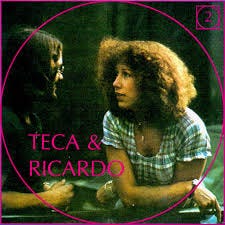Always Be Searching
The short route to the underheard music of Teca & Ricardo
After the maverick Brazilian musician Hermeto Pascoal died last week, music scribes all over the world fired up the laptops to offer remembrances of the man, his work and his extraordinary — and exceedingly difficult to quantify — impact on music generally. (I was among them; a short discographical survey, which included some lesser-heard gems appeared in this space.)
Today I’d like to retrace how the routine search for Hermeto music led to an encounter with an unexpected delight: The music of Teca & Ricardo.
As ever, the (hurry-up) quest for cool lesser-known Hermeto Pascoal titles was the most pleasurable work imaginable. It involved listening to a stack of records Pascoal released during his long career, as well as projects that featured Pascoal as soloist or special guest and others where his participation was more as a sideman. I could have done this for days: Discogs lists a bunch of appearances, and even more compilations.
After listening to tracks from a bunch of them, I stumbled onto the above video of Pascoal, the guitarist and composer Egberto Gismonti and percussionist Nana Vasconcelos performing at the 1975 Berlin Jazz Festival. These intersections are always at the least educational and often transcendent; I didn’t include the clip in last week’s post because it’s incomplete, has erratic audio and doesn’t spotlight the three performing together all that often. But it’s historically significant, a meeting of three titans.
If you’re still reading (thanks!), do not deny yourself this moment, a transition to the next phase of the search; it’s music from the faraway past that offers a meditative reminder that everything is and can be beautiful….
Vasconcelos’ sparks-flying percussion textures inspired a book idea, a kind of speculative reverie on what his life might have been like in the mid-’70s, when he was collaborating frequently with Gismonti and other forward-looking improvisors while also recording with Brazilian MPB artists. He was clearly touring a lot, probably lugging his hand-percussion rig to studios on a fairly regular basis, a ninja hired to animate records like the trippy and beautiful Visions of Dawn with the vocalist Joyce and guitarist/composer Mauricio Maestro. That marvel, made in Paris in 1976 but unreleased for decades, is a delightfully austere showcase for Vasconcelos in an acoustic setting; we hear how his every utterance (including plain-old heavy breathing) contributes to the overall rhythm.
The next step was an accident. On the Vasconcelos Discogs page, under Appearances, I spotted a 1975 project by a duo called Teca & Ricardo, which was also recorded in Paris and also features Vasconcelos. Turned out to be the second album from a duo formed during Brazil’s dictatorship; shortly after Ricardo Vilas was banned from Brazil, he moved to Paris to continue his musical career. There he encountered the singer Teca Calazans (also Brazilian, from an established musical family).
The duo’s first recording, first released as Musique Et Chants Du Brésil 1 and later Teca & Ricardo 1, contained a few originals alongside empassioned, at times homesick-sounding, arrangements of traditional Brazilian songs.
Among those participating: Guitarist and composer Nelson Angelo — whose 1972 Nelson Angelo e Joyce is revered as one of the most inventive songwriter records of Musica Popular Brazileira — and Novelli, the guitarist who was part of the collective that contributed to the Milton Nascimento/Lo Borges masterwork Clube de Esquina.
That glance at the personnel list was all it took. Within an hour I was in the Teca & Ricardo immersion program.
The first album I found on streaming was Teca & Ricardo 2, the one with Vasconcelos. It moves around a bit, starting in a simple folkloric vibe (Nana making the time happen on just triangle), then conjuring mid-tempo samba, “Ricardo Censurado,” which is saturated with saudade from the very start, then into pieces that are at once accessible and just slightly and wonderfully left of center. The song below, with its knotty harmony and tasteful electric guitar, is one of several that show the influence of Edu Lobo:
Some of this record snapped into focus after I spent time with the first album, which contains sharp, clever updates of traditional rhythms and (multitracked) chants, like this:
Here’s one of the more orchestrated pieces from the second album, again featuring Vasconcelos’ extraordinary triangle work, and some gorgeous lines for winds (oboe!)…
One striking characteristic of these projects: Though Teca & Ribero were not making big hits, they some had budgets — their records are adorned with interesting string writing, unusual combinations of instruments (listen for synths in some of the plush orchestrations), beautiful multitracked vocals and impressive instrumentalists (like the guitarist Leonardo Ribeiro featured on the above album). This duo was deliberate about its sonic signature; it sounds like most of the albums required more than a day or two in the studio.
The duo made six albums; its last, Povo Daqui, was released in 1980. Among its treasures is a studio-orchestra setting of Villa-Lobos’ “Caico.”
Interestingly, that same piece turns up on one of Teca Calazans solo projects, a celebration of the work of the composer Hector Villa-Lobos recorded in 1999.
If you couldn’t tell from her work with Ricardo Vilas, this confirms it: Calazans is a tremendous presence as a singer, full stop. Like many Brazilian vocalists, she has impeccable pitch, and deep control of pretty much every intervallic leap she attempts. She communicates through understatement — like Joyce and Wanda Sa — and yet somehow manages to phrase so as to gently magnify the rhythmic complexities — she doesn’t need to be singing a samba to convey the bouyant sway of samba.
I still can’t quite understand why the work she’s done — as part of the Teca & Ricardo duo, and subsequently on her own — is not more widely known. If forced to make one of those “Recommended If You Like….” lists, I’d say these records would captivate fans of: Nelson Angelo and Joyce, Edu Lobo, Caetano Veloso, Chico Buarque, Milton Nascimento, Roberto Menescal, Beto Guedes, Nara Leao, Antonio Carlos e Jocafi, and on and on. Enjoy!
Postscript: Just located some of the solo work of Ricardo Vilas recorded subsequent to the duo’s split. Going there next….).



